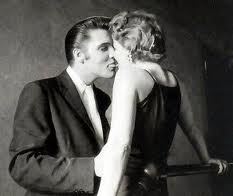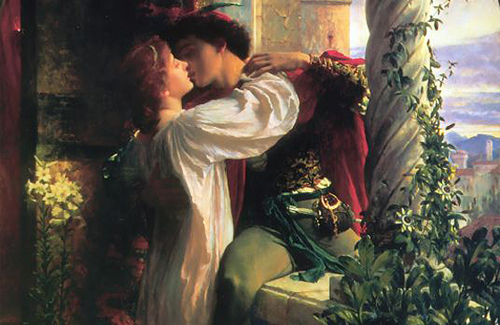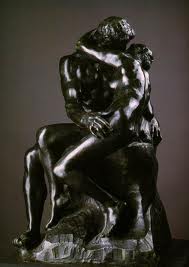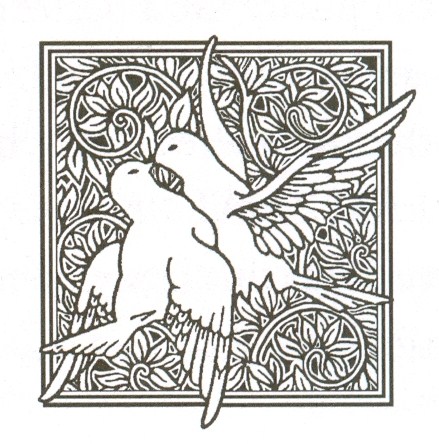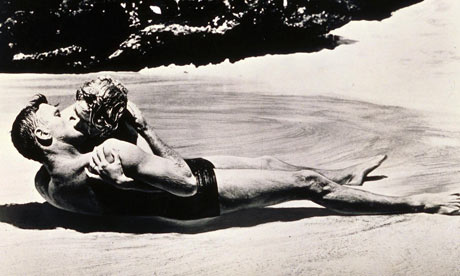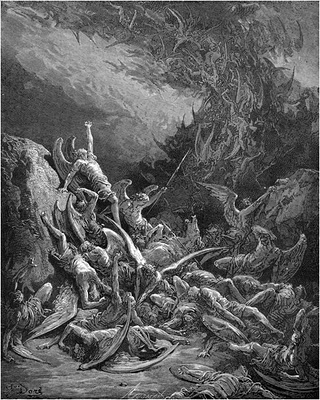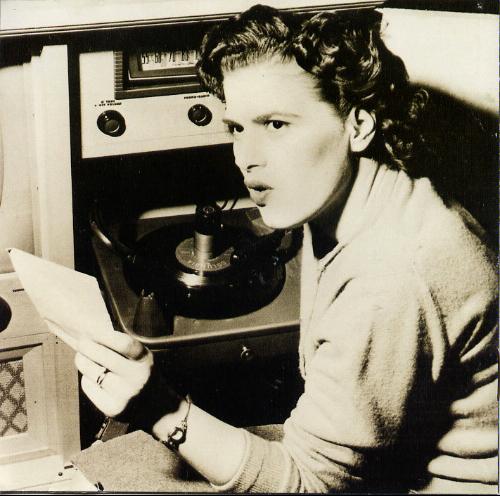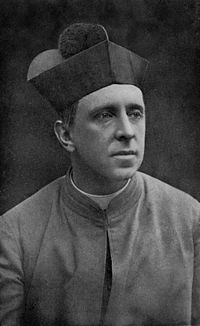|
home | what's new | other sites | contact | about |
||||||||||||||||||||||||||||||||||||||
|
Word Gems exploring self-realization, sacred personhood, and full humanity
Heloise and Peter
Abbess Heloise d'Argenteuil, (c. 1100 - 1164) and Theologian Peter Abelard (1079 - 1142)
“Heloise was a French nun, writer, scholar, and abbess, best known for her love affair and correspondence with Peter Abelard… “Peter Abelard was a medieval French scholastic philosopher, theologian and preeminent logician. His love for, and affair with, Heloise d'Argenteuil have become legendary… “Heloise was a brilliant scholar of Latin, Greek and Hebrew, and had a reputation for intelligence and insight. Abelard writes that she was nominatissima, "most renowned" for her gift in reading and writing. Not a great deal is known of her immediate family except that in her letters she implies she is of a lower social standing than was Abelard, who was originally from the nobility, though he had rejected knighthood to be a philosopher… “Abelard… was the eldest son of a minor noble French family. As a boy, he learned quickly. His father, a knight called Berenger, encouraged Pierre to study the liberal arts, wherein he excelled at the art of dialectic (a branch of philosophy), which, at that time, consisted chiefly of the logic of Aristotle transmitted through Latin channels. Instead of entering a military career, as his father had done, Abelard became an academic. During his early academic pursuits, Abelard wandered throughout France, debating and learning, so as (in his own words) "he became such a one as the Peripatetics”… Wikipedia
Editor's note: Heloise and Peter are famous for their love letters. I've written about them elsewhere and will again offer that information below. Kairissi and Elenchus will also comment.
**********************************************************
The love story of Heloise and Peter Abelard is considered by many to be among the most compelling, and most tragic, of history. Their romance of nearly 1000 years ago still fires hearts and imaginations today.
Below, you will find excerpts from the letters of Heloise and Peter; and several Editor's comments.
Some historical/biographical information from the 'net:
The Historia calamitatum recounts Abelard's early philosophical career and his first encounter with Heloise. Born in 1079, the brilliant theologian ... had gone on to win a fearsome reputation as a debater. He had successfully challenged his masters, [the future "saint"] Anselm of Laon and William of Champeaux, eventually displacing the latter as head of the cathedral school at Notre Dame in Paris. But success, as he writes, "always puffs up fools with pride," and exposed him to a new danger.
Around the year 1118, nearing forty years of age, he took on as a student a girl of eighteen, Heloise, and they fell in love. "In looks she did not rank lowest while in the extent of her learning she stood supreme." To facilitate their meetings, he arranged to take lodging in the house of her uncle, the Canon Fulbert, where she also resided. "We were united, first under one roof, then in soul; and so, under the pretext of our lessons, we abandoned ourselves entirely to love. Her studies allowed us to withdraw in private, as love desired, and then with our books open before us, more words of love than of our reading passed between us, and more kissing than teaching. My hands strayed oftener to her bosom than to the pages; love drew our eyes to look on each other more than reading kept them on our texts."
Inevitably, Heloise's uncle discovered them, and soon afterwards she found herself pregnant. Abelard sent her to stay with his sister [in Le Pallet, Brittany, 240 miles southwest of Paris] until she was delivered. To make amends with her uncle, Fulbert, he agreed to marry her, but stipulated that the wedding be kept secret. She was opposed to this solution: such a marriage would not appease her uncle; it would jeopardize the continuation of his career, she argued, and ultimately betray her own freedom of spirit, the basis of her love for him. They were married, however, despite her objections.
Then, fearing public disclosure, Abelard had her placed in a convent in Argenteuil [northwestern Paris]. When Fulbert discovered this move, he concluded that Abelard was seeking simply to rid himself of Heloise, and proceeded to exact a gruesome vengeance: acting on his orders, his servants attacked Abelard one night as he slept, and castrated him. Recovering from the pain and shame as best he might, Abelard entered the cloister at St. Denis [northern Paris] as a monk in 1119, while Heloise took the veil, at his bidding, in the convent at Argenteuil. His career continued to bring him into conflict with all around him, reaching a low point with the condemnation of his treatise, On the Unity and Trinity of God, at the council at Soissons in 1121. In flight from St. Denis, he took refuge in a remote spot near Troyes [90 miles southeast of Paris]; there, with the help of his students, he founded and built an oratory which he dedicated to the Paraclete, the Holy Spirit. Shortly thereafter he became abbot at the abbey of St. Gildas in Brittany [northwest France, coastal region], where he found undisciplined monks hostile to his reforms, who plotted against his life. Heloise during this time had struggled to reconcile herself to the religious vocation which she had accepted, not of her own volition, as she writes, but at her husband's command. Tormented by grief over their brutal separation, she had nevertheless earned a reputation for wise administration as prioress at Argenteuil.
In 1128, however, the convent was taken over as a property of St. Denis, and the nuns were expelled. Abelard then intervened to welcome them to his own oratory of the Paraclete, where Heloise assumed the office of abbess. They remained in contact thereafter, but apparently on a wholly impersonal level, until the moment around 1132 when a copy of his Historia calamitatum found its way into her hands. At this point their correspondence begins. Their Latin style is ornate and studied, set off by complex parallel constructions and elegant inversions of word order. Abelard, especially, tends to buttress his exposition with accumulated Biblical citations. Heloise writes much more spontaneously of very intimate feelings - and, in her writings, we are treated to an element of high literariness, associated with the vernacular love poetry of the Troubadours. The letters constitute a philosophical dialogue on love, marriage, and spirituality and offer a searching analysis of a personal, universal experience which has challenged and moved readers in every age.
excerpts from the letters of Heloise and Peter
Recently, my beloved, by chance someone brought me the letter of consolation you had sent to a friend. I saw at once from the heading that it was yours, and was all the more eager to read it since the writer [Peter] is so dear to my heart.
Having lost him in reality I hoped at least to create an image of him from the words. But nearly every line of this letter was filled ... with gall and wormwood [a poisonous bitterness], as it told the pitiful story of our entry into religion and the crosses which you, my only love, continue to bear...
First you revealed the persecution you suffered from your teachers, then the supreme treachery of the injury to your body, and then you described the abominable jealousy and violent attacks of your fellow-students, Alberic of Rheims and Lotulf of Lombardy... Then you related the plots against you by your abbot and false brethren, the foul slanders spread against you by those two pseudo-apostles, your rivals [such as the future "saint" and bitter enemy, Bernard of Clairvaux], and the scandal stirred up among many people because you had acted contrary to custom in naming your oratory after the Paraclete. You [fought] the incessant, intolerable persecutions which you still endure at the hands of that cruel tyrant and the evil monks you call your sons, and so brought your sad story to an end.
No one, I think, could read or hear it dry-eyed; my own sorrows are renewed by the detail in which you have told it, and increased because you say your perils are still increasing. All of us here [at the convent] are driven to despair of your life, and every day we await in fear and trembling the latest rumors of your death... Thank you for writing ... the one way in which you can show yourself to me; for I never have a letter from you without the immediate feeling that we are together. If pictures of absent friends give us pleasure, renewing our memories and relieving the pain of separation even if they cheat us with empty comfort, how much more welcome is a letter which comes to us in the very handwriting of an absent friend...
I was quite surprised and troubled by your forgetfulness, when neither reverence for God nor our mutual love ... made you think of trying to comfort me, wavering and exhausted as I was by prolonged grief, either by word when I was with you or by letter when I was apart from you... You are closely bound to me by the marriage sacrament uniting us; and even more so by the love I have always borne you: it is, as everyone knows, a love which is beyond all bounds.
as everyone knows... as the whole world knows
You know, beloved, as the whole world knows, how much I have lost in you, how in one wretched stroke that supreme act of flagrant treachery robbed me of my very self in robbing me of you...
and how my sorrow for my loss is nothing compared with what I feel for the manner in which I lost you. Surely, the greater the cause for grief, the greater the need for consolation, and this, no one can bring but you; you are the sole cause of my sorrow, and you alone can grant me the grace of consolation.
You alone can make me sad, or bring me happiness or comfort...
you alone have so great a debt to repay me, particularly now that I have carried out all your orders so implicitly that when I was powerless to oppose you in anything, I found strength at your command to destroy myself. I did more, strange to say - my love rose to such heights of madness that it robbed itself of what it most desired, beyond hope of recovery, when immediately at your bidding I changed my clothing, along with my mind, in order to prove you the possessor of my body and my will alike.
to prove you the possessor of my body and my will alike
Never, God knows, did I seek anything in you, except yourself; I wanted only you, nothing of yours.
I just want you, and nothing of yours
I looked for no marriage bond, no marriage portion, and it was not my own pleasures and wishes I sought to gratify, as you well know, but yours. The name of wife may seem more sacred or more worthy [to some] - but sweeter to me will always be the word lover; or, if you will permit me, that of concubine or whore!
sweeter to me will always be the word lover
God is my witness... that if Augustus, Emperor of the whole world, thought fit to honour me with marriage and conferred all the Earth on me to possess for ever, it would be dearer and more honorable to me to be called not his Empress but your whore.
conferred all the earth on me
For a man's worth does not rest on his wealth or power; these depend on fortune, but his worth is measured by his merits. And a woman should realize that if she marries a rich man more readily than a poor one, and desires her husband more for his possessions than for himself, she is offering herself for sale.
offering herself for sale
Certainly any woman who comes to marry through desires of this kind deserves wages, not love; for clearly her mind is on the man's property, not himself, and she would be ready to prostitute herself to a richer man, if she could ... Unless you come to believe that there is no better man nor worthier woman on earth you will always still be looking for what you judge the best thing of all - to be the husband of the best of wives and the wife of the best of husbands...
she deserves wages not love
[In the eyes of the world I am] wholly guilty ... [but] I am also, as you know, wholly innocent. It is not the deed but the intention of the doer which makes the crime, and justice should weigh not what was done but the spirit in which it is done.
not the deed but the intention of the doer makes the crime
What my intention towards you has always been, you alone who have known it can judge. I submit all to your scrutiny, yield to your testimony in all things. Tell me one thing, if you can. Why, after our entry into religion, which was your decision alone, have I been so neglected and forgotten by you that you neither speak to me when you are here, nor write to me when you are absent? Tell me, I say, if you can - or I will tell you what I think and indeed the world suspects. It was concupiscence, not friendship which bound you to me, the flame of lust rather than love. So when the end came to what you desired, any show of feeling you used to make vanished with it. This is not merely my own opinion, beloved, it is everyone's. There is nothing personal or private about it; it is the general view which is widely held. I only wish that it were mine alone, and that the love you professed could find someone to defend it so my grief might subside for a while. I wish I could think of some explanation which would excuse you and somehow cover up the way you hold me cheap. I beg you then to listen to what I ask - you will see that is a small favor which you can easily grant. While I am denied your presence, give me at least through your words ... some sweet semblance of yourself... I carried out everything for your sake and continue up to the present moment in complete obedience to you. It was not any sense of vocation which brought me as a young girl to accept the austerities of the cloister, but your bidding alone, and if I deserve no gratitude from you, you may judge for yourself how my labors are in vain. I can expect no reward for this from God, for it is certain that I have done nothing as yet for love of him.
following you into Hell itself When you hurried towards God I followed you; indeed, I went first to take the veil - perhaps you were thinking how Lot's wife turned back when you made me put on the religious habit and take my vows before you gave yourself to God. Your lack of trust in me over this one thing, I confess, overwhelmed me with grief and shame. I would have had no hesitation, God knows, in following you, or going ahead, at your bidding, to Hell itself.
my heart, if not with you, is nowhere... without you, it cannot exist My heart was not in me, but with you, and now, even more, if it is not with you it is nowhere; truly, without you it cannot exist. See that it fares well with you, I beg, as it will if it finds you kind, if you give grace in return for grace, small for great, words for deeds. Would that your love were less sure of me, beloved, so that you would be more concerned on my behalf! But as it is, the more I have made you feel secure in me, the more I have to bear with your neglect.
the end is proof of the beginning Remember, I implore you, what I have done, and think how much you owe me. While I enjoyed with you the pleasures of the flesh, many were uncertain whether I was prompted by love or lust; but now the end is proof of the beginning. I have finally denied myself every pleasure in obedience to your will, kept nothing for myself except to prove that now, even more, I am yours. Consider then your injustice, if, when I deserve more, you give me less, or rather, nothing at all, especially when it is a small thing I ask of you and one you could so easily grant.
your Heloise... farewell, My Only Love And so, in the name of God to whom you have dedicated yourself, I beg you to restore your presence to me in the way you can...
by writing me some word of comfort, so that in this at least I may find increased strength and readiness to serve God. When in the past you sought me out for sinful pleasures your letters came to me often, and your many songs put your Heloise on everyone's lips, so that every street and house echoed with my name. Is it not far better now to summon me to God than it was then to satisfy our lust? I beg you, think what you owe me, give ear to my pleas, and I will finish a long letter with a brief ending: farewell, my Only Love.
Editor's note: A reader offered to me the following story. She was picking up her 3 year-old grandson from preschool. The little boy bounded toward her, but then stopped, as if he'd suddenly remembered a duty. Turning about, he raced back to the frontsteps upon which a little girl had been watching, and waiting... for him. In a very natural way, with no thought of embarrassment, as if all the world easily lived within the boundaries of such affection, he kissed her, and then resumed course for his grandmother... Who will doubt that we are hard-wired for relationship-love? further, in some cases, early love is no mere instinctual response, but can be the first stirrings of an eternal pledge of the soul.
To Heloise, his dearly beloved sister in Christ, Abelard her brother in Christ. If since our conversion from the world to God I have not yet written you any word of comfort or advice, it must not be attributed to indifference on my part but to your own good sense, in which I have always had the highest confidence. I did not think you would need these things, since God's grace has given you all that you might need to instruct the erring, comfort the weak and encourage the fainthearted, both by word and example, as, indeed, you have been doing since you first held the office of prioress under your abbess.
So if you still watch over your daughters as carefully as you did previously over your sisters, it is sufficient to make me believe that any teaching or exhortation from me would now be wholly superfluous. If, on the other hand, in your humility you think differently, and you feel that you have need of my instruction and writings in matters pertaining to God, write to me what you want, so that I may answer as God permits me. Meanwhile, thanks be to God who has filled all your hearts with anxiety for my desperate, unceasing perils, and made you share in my affliction; may divine mercy protect me through the support of your prayers and quickly crush Satan beneath our feet. To this end in particular, I hasten to send the psalter you once earnestly begged from me, my sister, once dear in the world, and now dearest in Christ, so that you may offer a perpetual sacrifice of prayers to the Lord for our many great aberrations, and for the dangers which daily threaten me.
We have indeed many examples as evidence of the high position in the eyes of God and his saints which has been won by the prayers of the faithful, especially those of women on behalf of their dear ones and of wives for their husbands. The Apostle observes this when he bids us pray continually. We read that the Lord said to Moses Let me alone, to vent my anger upon them, and to Jeremiah Therefore offer no prayer for these people nor stand in my path. By these words the Lord himself makes it clear that the prayers of the devout set a kind of bridle on his wrath and check it from raging against sinners as fully as they deserve; just as a man who is willingly moved by his sense of justice to take vengeance can be turned aside by the entreaties of his friends and forcibly restrained, as it were, against his will. Thus when the Lord says to one who is praying or about to pray, Let me alone and do not stand in my path, he forbids prayers to be offered to him on behalf of the impious; yet the just man prays though the Lord forbids, obtains his requests and alters the sentence of the angry judge. And so the passage about Moses continues: And the Lord repented and spared his people the evil with which he had threatened them. Elsewhere it is written about the universal works of God, He spoke, and it was. But in this passage it is also recorded that he had said the people deserved affliction, but he had been prevented by the power of prayer from carrying out his words. Consider then the great power of prayer if we pray as we are bidden, seeing that the prophet won by prayer what he was forbidden to pray for, and turned God aside from his declared intention. [Here Abelard cites passages from scripture concerning prayer and the special power of prayers by women. His letter then concludes] But if the Lord delivers me into the hands of my enemies so that they overcome and kill me, or if by whatever chance I enter upon the way of all flesh while absent from you, wherever my body may lie, buried or unburied, I beg you to have it brought to your burial ground, where our daughters, or rather, our sisters in Christ may see my tomb more often and thereby be encouraged to pour out their prayers more fully to the Lord on my behalf. There is no place, I think, so safe and beneficial for a soul grieving for its sins and desolated by its transgressions than that which is specially consecrated to the true Paraclete, the Comforter, and which is particularly designated by his name. Nor do I believe that there is any place more fitting for Christian burial among the faithful than one located among women dedicated to Christ. Women were concerned for the tomb of our Lord Jesus Christ, they came ahead and followed after, bringing precious ointments, keeping close watch around this tomb, weeping for the death of the Bridegroom, as it is written: The women sitting at the tomb wept and lamented for the Lord. And there they were first reassured about his resurrections by the appearance of an angel and the words he spoke to them; later on they were found worthy both to taste the joy of his resurrection when he twice appeared to them, and also to touch him with their hands. Finally, I ask this of you above all else: at present you are over-anxious about the danger to my body, but then your chief concern must be for the salvation of my soul, and you must show the dead man how much you loved the living one by the special support of prayers chosen for him. Live, fare you well, yourself and your sisters with you, Live, but I pray, in Christ be mindful of me.
I will love no other! no other!
Editor's note: When Heloise asserts that she will "love no other," she expresses no willfulness in the face of possible other romantic association. John and Mary believe that they might have married other partners; for them, suffering under the blindness of the Small Ego, it is true - but for Twins, as Heloise insists, there is no other.
We were also very surprised when instead of bringing us the healing balm of comfort you increased our desolation and made the tears to flow which you should have dried. For which of us could remain dry-eyed on hearing the words you wrote toward the end of your letter: But if the Lord delivers me into the hands of my enemies so that they overcome and kill me... My dearest, how could you think such a thought? How could you give voice to it? Never may God be so forgetful of his humble handmaids as to let them outlive you; never may he grant us a life which would be harder to bear than any form of death...
You ask us, my love, if you chance to die when absent from us, to have your body brought to our burial-ground so that you may reap a fuller harvest from the prayers we shall offer in constant memory of you. But how could you suppose that our memory of you could ever fade? Besides, what time will we have then for prayer, when extreme distress will allow us no peace, when the soul will lose its power of reason and the tongue its use of speech? Or when the frantic mind, far from being resigned, may even (if I may say so) rage against God himself, and provoke him with complaints instead of placating him with prayers?
In our misery then we shall have time only for tears and no power to pray; we shall be hurrying to follow, not to bury you, so that we may share your grave instead of laying you in it. If we lose our life in you, we shall not be able to go on living when you leave us. May we not even live to see that day. The mere mention of your death is death to us. What will the reality of that death be like if it finds us still alive? God, grant we may never live on to perform this duty, to render you the service which we look for from you alone; in this may we go before, not after you! And so, I beg you, spare us - spare her at least, who is yours alone, by refraining from words like these. They pierce our hearts with swords of death, so that what comes before is more painful than death itself. A heart which is exhausted with grief cannot find peace, nor can a mind preoccupied with anxieties genuinely devote itself to God.
a mind preoccupied with anxieties cannot genuinely devote itself to God... no power to pray Editor's note: Heloise well captures the sense of my words elsewhere regarding the need for emotional healing in Summerland before moving on to greater spirituality: "Certain kinds of loss are so compelling; so fraught with despair and disillusionment; so devastating to primal need and to what should have been; so commanding of one's attention and deepest affections; so insistent and bordering on the obsessive; that injured hearts will not allow any beguilement, cajoling, any artifice of mere words, empty platitudes, or pseudo-spiritual talk, to distract them from that most pressing cold reality..." One of the afterlife testimonies received by Randall and French speaks of an astral sub-world wherein, for a time, dwell once-bereft lovers. As part of their healing from the sufferings of our world, it is said that, as long as they need to, they do little but "cling to each other."
I beseech you not to hinder God's service to which you specially committed us. Whatever has to come to us bringing with it total grief we must hope will come suddenly, without torturing us far in advance with useless apprehension which no foresight can relieve...
if I lose you, what have I left to hope for? But if I lose you, what have I left to hope for? Why continue on life's pilgrimage, for which I have no support but you, and none in you save the knowledge that you are alive...
the joy of your presence now that I am forbidden all other pleasures in you and denied even the joy of your presence which from time to time could restore me to myself?
Editor's note: A lover provides many avenues to joy. But the most elemental may also be the most potent - simply, the joy of her presence.
the joy of your presence, which could restore me to myself!
O God, cruel to me in everything! O Fortune who is only ill fortune! O God - if I dare say it - cruel to me in everything! O merciless mercy! O Fortune who is only ill fortune, who has already spent on me so many of the shafts she uses in her battle against mankind that she has none left with which to vent her anger on others.
She [Fortune] has emptied a full quiver on me, so that henceforth no one else need fear her attacks, and if she still had a single arrow she could find no place for a wound. Her only dread is that through my many wounds death may end my sufferings; and though she does not cease to destroy me, she still fears the destruction which she brings on. Of all wretched women I am the most wretched, and amongst the unhappy I am unhappiest. The higher I was raised when you preferred me to all other women, the greater my suffering over my own fall and yours, when I was thrown down; for the higher the ascent, the heavier the fall. Among great and noble women, whom did fortune ever place higher or as high as she placed me? Whom did she then cast down and destroy with a similar grief? What glory she gave me in you, what ruin she brought upon me through you! Violent in either extreme, she showed no moderation in good or evil. To make me the saddest of all women she first made me blessed above all, so that when I thought how much I had lost, my consuming grief would match my crushing loss, and my sorrow for what was taken from me would be the greater for the fuller joy of possession which had gone before; and so that the happiness of supreme ecstasy would end in the supreme bitterness of sorrow.
Moreover, to add to my indignation at the outrage you suffered, all the laws of equity in our case were reversed. For while we enjoyed the pleasures of an uneasy love and abandoned ourselves to fornication (if I may use an uglier but more expressive word) we were spared God's severity. But when we amended our unlawful conduct by what was lawful, and atoned for the shame of fornication by an honorable marriage, then the Lord in his anger laid his hand heavily upon us, and would not permit a chaste union though he had long tolerated one which was unchaste.
Peter Abelard to Heloise And so I ask you, sister, to accept patiently what mercifully befell us. This is a father's rod, not a persecutor's sword. The father strikes to correct, lest the enemy strike to kill. By a wound he prevents death, he does not deal it; he thrusts in the steel to cut out disease. He wounds the body, and heals the soul; he gives life to what he should have destroyed, cuts out impurity to leave what is pure. He punishes once so that he need not punish forever. One suffers the wound so that two may be spared death; two were guilty, one pays the penalty...
Summary thoughts: I must tell you frankly, I find myself deeply moved by the passionate words of Heloise. Her insights into life and love are all the more remarkable as she is billed as the junior partner, while Peter, many have often said, is the "greatest philosopher and theologian" of the 12th century. This official assessment is so much nonsense; unless, by this we are to know that his peers are even more neurotic. In Heloise's letters we find expressed virtually all of the deep, primary truths of authentic romantic love conveyed to us by the afterlife testimonies and the best mystic teachers of our world. How astonishing. These truths are not easily garnered; cannot be derived from mere academic research - but, here they are, a formidable array, all laid out for the easy taking, in the passionate love letters of that little songbird, Heloise!
the greatest theologian And what of her friend, Peter Abelard? If she does not choke him, we are tempted to finish him off very soon. Has an intelligent and independently-minded girl ever given herself to another more fully, more sincerely, and without reservation, in the midst of greater grief, than did the perky Heloise? She is no coquette, never the guileful flirt. No, this girl is honest and forthcoming, always authentic; many would say, to a fault. Listen to her open heart and soul:
Regarding Peter's reply, I submit to you, in all of history, we have never before witnessed such lopsided and antithetically opposed answer - from the heights of her spirit-led and angelic discourse of true romantic love, to the Dark-Realm depths of fear, guilt, and shame-based answer! Notice the essence of Peter's philosophical position: He serves a god who "punishes once so that he need not punish forever"; a god "with a father's rod" who "strikes to correct";
He is obsessed with scriptures featuring a furious chieftain-god who must continually be flattered lest he charge, "Let me alone, to vent my anger upon them";
His mind, overwrought, is consumed by guilt, fear, and shame, such that, continually, he pleads with her to spend time offering "a perpetual sacrifice of prayers to the Lord for our many great aberrations";
Living in constant terror of death and judgment, he seeks for consolation by a promise from her: "I beg you," to be "brought to your burial ground, where" she and the sisters "may see my tomb more often and, thereby, be encouraged to pour out their prayers more fully to the Lord on my behalf," all "beneficial for a soul grieving for its sins and desolated."
Editor's note: How great is Peter's self-loathing! - so pervasive, coloring his entire perception of God, life, and love. He lives in a nightmare-world of primitive-man conceptions of wrathful divinity. Compare all this with Father Benson's teaching from the afterlife.
Heloise, the patron saint of Twin-Soul love
Are Heloise and Peter Twin-Souls? We can't know for sure, but I will tell you what I think. I suspect that they might be - no thanks to Peter. Here's why. Without access to libraries, the internet, a plethora of ready-wisdom sources from which to draw, Heloise, seemingly single-handedly, perceives many of the mysteries of true romantic love. How did she do that?
There is only one way. This spirited girl is approaching the status of enlightened person. She could not know what she knows without living on an elevated level of consciousness. Her own soul-energies have explained things to her; also, she could not know what she knows without contact with a Twin lover; albeit, a comatose one - but this will not delay her own instruction. And what about Peter? Can one as spiritually-offline as he really be a Twin? Norma taught that Twins progress at different rates; that, one might need to help the other catch up. In any case, one thing is clear: these two have switched roles - she is now "the greatest theologian."
the nearest Betty Ford Clinic There are hospitals and therapy centers in the Next World that offer healing for the abused and damaged religious. This is true. And, doubtless, his True Love, Heloise, unwilling ever to leave him, will have him checked into the nearest Betty Ford Clinic for Recovering Greatest Theologians.
"I'd be released in your tenderness"
The uncontained love of Heloise teaches us many things; but also begs the question, What is behind this kind of undiluted passion? What is its origin and purpose? We feel the white-hot intensity of her fervent spirit, even now, almost 1000 years after the fact. She represents a force of human will, desire, and fortitude which swallows up and defeats not only the apathy of her lover, but the evil of their enemies, even, that of behemoth collective-ego institutions which will yet lie prostrate and bend the neck before this goddess!
the greatest force and power in the universe
If we are wise, we will study and consider the irrepressible and spitfire-love of Heloise and be instructed by the Power behind it; that loving nature, that unbowed energy and indomitable purpose, reflecting the One-Person Divinity, in whose image she was made.
Kairissi. I am undone in the presence of Heloise. Many lovers have suffered the pangs of separation from a dear mate, but, with Heloise, we might have to award her the prize. Elenchus. It’s a prize none of us covets, yet one for which many will be required to strive. K. I don’t know what to say about Heloise and her passion. I am utterly stunned. She is not afraid to say anything if it helps her make plain to lunk-head Peter how much she loves him. E. (sighing) K. She’s not afraid to say she’d rather be his whore than his wife. She’s reaching for high-altitude expressions of how much her heart yearns to be one with him! E. I think I’ll let you comment on this love-affair. It’s red hot, too hot to handle. K. I can’t really say too much. It’s almost sacrilegious to offer commentary on Heloise’s statements. She is more than clear in what she means to convey, and I think we should just allow the readers to consider it all directly from her pen. E. I will just speak on one thing, a compliment to Heloise. K. Please. E. In our world, little girls, especially those of religious persuasion, are taught to be compliant, subservient, meek. And while, in most situations in life, the humble approach might be well-advised, any such profession of humility cannot, and must not, be borne of a self-loathing inner person. K. This is the primary difference between Heloise and Peter. E. I think so. I’ve read the afterlife reports from clear-eyed Spirit Guides who tell us that the person who insists on his own dignity, insists on him or herself in a self-respecting way, is the one who advances most easily and quickly on the other side, and in our world, too. K. The plain-spoken assertions of Heloise will be condemned by Big Religion, but that’s because their game is over if people begin to think for themselves and speak from their hearts. E. Heloise is not just some star-struck female but a highly advanced soul. We know this by her insistence on honoring her own sacred thoughts and intuitions. She trusts herself. She believes in the “still small voice” within, her link to God. This is our destiny. This is what we all must do. As such it's not without cause that I nominate her as “Patron Saint of Twin Soul Lovers”; indeed, she is able and commendable role-model for all. K. If romantic love represents ultimate reality, then, yes, she becomes universal example for emulation.
|
||||||||||||||||||||||||||||||||||||||
|
|
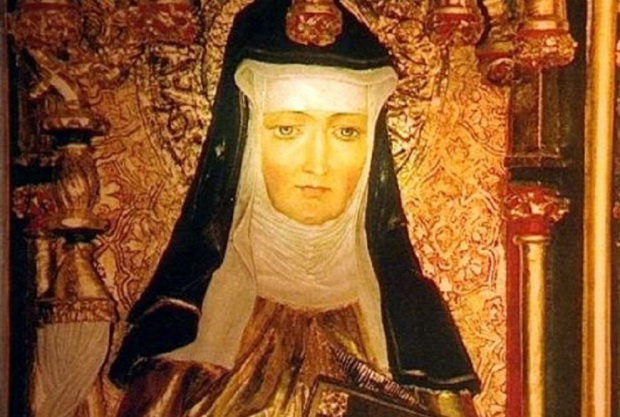

.jpg)




















